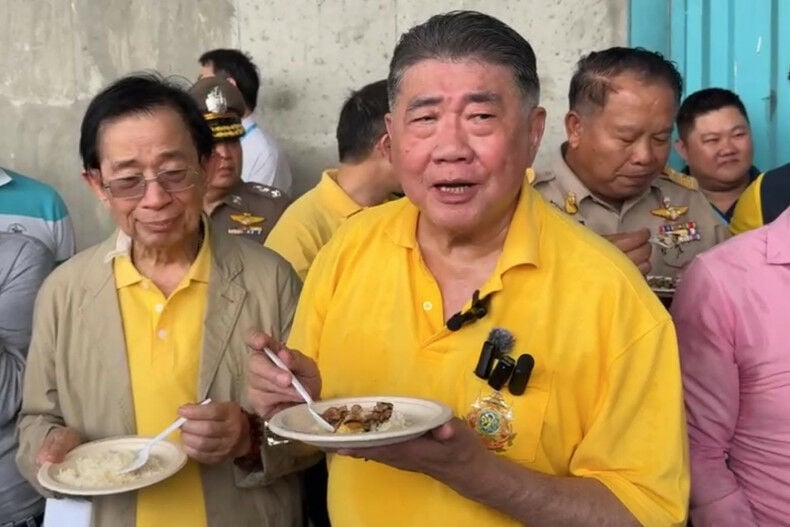Thai govt plans to ‘rice’ to the occasion with decade-old grain auction

The Thai government expressed a strong intent to auction off the last remaining stocks of decade-old rice.
This move is in line to replenish the state coffers, as made clear by Deputy Prime Minister and Commerce Minister Phumtham Wechayachai, in a recent Facebook post. The aged rice in question is part of the controversial rice-pledging scheme initiated during the administration of former Prime Minister Yingluck Shinawatra.
Phumtham emphasised that the auctioning of this old rice would be a more feasible alternative to letting it rot and lose all value. He went on to clarify that the Commerce Ministry holds no power over dictating the actions of any private company that wins the auction and decides to purchase the rice.
“From my understanding, several distillers have shown interest in acquiring the rice for alcohol production. Additionally, some rice exporters are considering tapping into markets in South Africa.”
Addressing concerns around the possible presence of aflatoxins in the aged rice, which could potentially lead to cancer, Phumtham assured that modern technology could be utilised to improve the rice’s quality, making it safe for consumption.
“I aim to fulfil my duties for the benefit of the country, yet my intentions seem to be misunderstood.”
Defence Minister Sutin Klungsang, during a visit to the 15th Military Circle in Phetchaburi, rebuffed reports suggesting that his ministry would purchase the old rice for feeding soldiers. He pledged that only good-quality food would be provided to every soldier.
“Be assured that no substandard rice will be served.”
Prime Minister Srettha Thavisin previously announced that the government will send rice samples for laboratory testing to confirm their safety. Government spokesperson Chai Wacharonke also revealed plans to contact the Department of Medical Sciences to conduct tests on the rice stored in Surin warehouses.
This step aims to alleviate social media-induced fears about the rice’s safety for consumption or sale, reported Bangkok Post. However, Weerachai Phutdhawong, a renowned organic chemistry expert, who was asked to test samples from Surin, has reportedly found aflatoxins on the rice. Aflatoxins are known to increase the risk of liver cancer.
UPDATE: Thailand to test decade-old rice stockpile for safety
The Government of Thailand confirmed that it will conduct lab tests on a decade-old rice stockpile to ascertain its safety for human consumption. This rice, a remnant from the tenure of ex-Prime Minister Yingluck Shinawatra, has been stored in Surin warehouses. Prime Minister Srettha Thavisin assured this move in response to public demand for an official inspection of the rice quality by independent bodies.
The 62 year old prime minister’s declaration followed a series of public rice-eating stunts by Deputy Prime Minister and Commerce Minister Phumtham Wechayachai and himself. These efforts were aimed at convincing the public about the rice’s edibility. The rice, a part of the contentious rice-pledging scheme from a decade ago, has been under scrutiny for its safety.
Addressing the matter, Srettha said the government treats consumer safety as very important.
“If it [the old rice] is proved to be unsafe to eat, we aren’t going to sell it. The government has quite a clear stance on this.”
He was also responding to reports about the government’s potential plans to export the decade-old rice to Africa, while critics suggested its use for alcohol or vinegar production.
The Department of Medical Sciences will conduct the rice tests to counter various social media claims about the rice being unfit for consumption or sale, a government spokesman confirmed.
These claims include those from an organic chemistry expert, Associate Professor Weerachai Phutdhawong from Kasetsart University, who detected aflatoxins in the rice during preliminary testing. Aflatoxins, toxins commonly found in crops, are linked to an increased risk of liver cancer.
The government’s move to test the rice also aims to dismiss accusations of attempting to conceal the Yingluck administration’s rice-pledging scheme. The government spokesman urged Weerachai to provide more information about his testing methods and the aflatoxin levels found, questioning the legitimacy of his claims and his access to the rice samples, reported Bangkok Post.
Despite the controversy, the government remains firm that aflatoxin levels of no more than 20 parts per billion are deemed safe for consumption. Further lab testing of the rice will start, tomorrow, May 13.
UPDATE: Concerns rise over Thai ministry’s plan to sell decade-old rice
Concerns are escalating over the Thai Commerce Ministry’s plan to sell decade-old rice from the former government’s rice-pledging scheme. Consumer safety watchdogs, including the Office of the Consumer Protection Board (OCPB) and the Food and Drug Administration (FDA), have been urged to investigate potential aflatoxin and chemical contamination in the grain.
This appeal comes in the wake of Commerce Minister Phumtham Wechayachai’s recent publicity stunt, in which he consumed rice from a batch stored in Surin province warehouses since the Yingluck Shinawatra administration. The minister’s actions were intended to instil consumer confidence in the rice, which he aims to auction off to raise between 200 and 400 million baht (US$ 5.4 and US$10.8 million).
Head of the Network of Universities for Reform, Wirangrong Dabbaransi, voiced her concerns on social media, stating that the minister’s rice-eating display cannot guarantee the quality or safety of the grains. Wirangrong highlighted that the rice, which appears to be in good condition, has been through 129 cycles of fumigation over a decade.
Washing the rice multiple times, as was reported, does not eliminate all chemical substances or potential aflatoxin, a toxin produced by certain fungi under warm and humid conditions.
The proposed sale of this rice, Wirangrong warns, could have dire implications for public health and harm Thailand’s global reputation. Challenging the minister’s confidence in the grain, she suggested exporting the rice with a quality guarantee.
Chiang Mai University faculty member, Assoc Prof Pantipa Pongpiachan, expressed a similar sentiment, suggesting that the rice is unfit for human or animal consumption and should be used in alcohol production instead. Pantipa pointed out that the presence of insects in the rice suggests improper storage and the brownish hue of the cooked grains indicates potential fungal contamination.
Rice Sale
Meanwhile, Thai Pakdee Party leader Warong Dechgitvigrom questioned the quality of the decade-old rice, noting that previous bid winners failed to collect their purchases, and the fourth bidding round was cancelled a day before submission. Warong accused Phumtham of intentionally delaying the fourth round of bidding for his publicity stunt.
Defying criticisms, Phumtham stood firm on his decision to sell the rice, arguing that he was transparently managing old rice stockpiles. Public Health Minister Somsak Thepsuthin pledged to instruct the Department of Medical Sciences to investigate the rice quality within seven days, reported Bangkok Post.
Yongyuth Thammawut, Chief of the Department of Medical Sciences, clarified that the department only conducts tests upon request and has not yet received any such request regarding the decade-old rice.
ORIGINAL STORY: Grain gamble: Decade-old rice from Surin warehouses still fresh
Stored for over a decade, rice from the warehouses in Surin, dating back to Yingluck Shinawatra‘s term in office, has been confirmed to be in good condition. Commerce Minister Phumtham Wechayachai, gave an assurance of the rice’s quality and announced that a bidding process for it is scheduled for next week.
Phumtham, along with representatives from the private and public sectors, rice surveyors, the Thai Rice Mill Association, rice exporters, and journalists, visited two Surin rice warehouses yesterday, May 6.
The purpose of the visit was to inspect the rice that has been stored for more than ten years, confirming its good quality and edibility. The rice had been housed in these warehouses as a part of the rice-pledging scheme initiated during Yingluck’s tenure as prime minister.
The two warehouses visited were the Kittichai warehouse in the Prasat district and the Poolphol Trading Co warehouse in the Mueang district. The Kittichai warehouse received 258,106 sacks of rice, totalling 26,094 tonnes from 24 rice mills under the scheme on January 3, 2014.
On the other hand, the Poolphol Trading Co. warehouse received 94,637 sacks, amounting to 9,567 tonnes from six mills on March 14, 2014.
Currently, the Kittichai warehouse and Poolphol Trading Co. warehouse have 112,711 sacks weighing 11,656 tonnes and 32,879 sacks weighing 3,356 tonnes left, respectively.
The visit was prompted by a claim from a Surin rice expert who doubted the edibility of ten-year-old rice and questioned the feasibility of Phumtham’s plan to auction the rice for consumption. The expert’s claim followed Phumtham’s previous visit to the same warehouses in March when he had vouched for the rice’s quality and edibility.
“The bidding should be able to start in a week at the earliest. We’ll make it quick and independent.”
During the recent visit, Phumtham dismissed the expert’s assertion, emphasising that the longevity of rice depends largely on its preservation. He stated that if rice is well-preserved, it could last a long time, whereas poor preservation could lead to spoilage within a year.
He further assured that the rice at both warehouses had been carefully preserved and frequently fumigated. Additionally, both warehouses were completely sealed to prevent the intrusion of birds and rainwater.
From the bidding, the minister anticipates raising about 200 to 400 million baht, reported Bangkok Post.
Latest Thailand News
Follow The Thaiger on Google News:


























